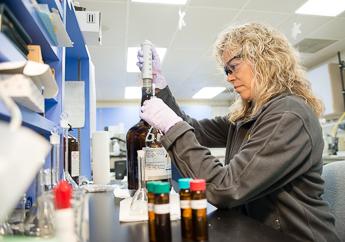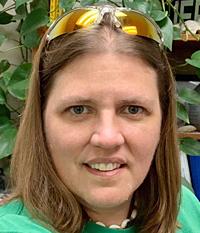
The Environmental Services Program provides analytical information and scientific data that supports the department. The program also provides direct assistance to local communities and emergency responders throughout Missouri.
The program's Chemical Analysis Section staffs the state’s environmental laboratory. The laboratory is certified by the U.S. Environmental Protection Agency to perform chemical analyses of public drinking water samples. This service is provided to all public drinking water systems statewide. The laboratory also analyzes air, soil, sludge and water samples to identify and confirm the presence of natural and man-made pollutants. The laboratory reports 258,000 results from 21,000 samples annually.
The program's Air Quality Monitoring Section operates about 192 air monitoring instruments at 44 locations statewide. These instruments monitor air pollutants known to affect people’s health. This data may determine whether an area meets federal standards for ozone, carbon monoxide and other pollutants. The data also helps department staff identify air pollution trends, investigate citizen complaints, determine sources of air pollution and keep Missourians informed of current air quality.
The program's Water Quality Monitoring Section performs monitoring to assess the health of lakes, rivers and streams. This section collects water and sediment samples throughout Missouri and performs biological monitoring, stream surveys, monitoring of fish tissues, and bacterial analyses of surface waters as well as other sampling events and special studies.
The program's Environmental Emergency Response Section provides 24/7 support and response to significant and imminent hazardous substance releases, natural or man-made disaster and homeland security threats that may impact public safety and the environment. The section also supports law enforcement in managing hazardous wastes associated with illegal drug labs.
In case of an environmental emergency, call the department's 24-hour Environmental Emergency Response Spill Line at 573-634-2436.
Meet the Director - Lynn Milberg

Lynn Milberg became director of the Environmental Services Program on Feb. 1, 2022.
Lynn started with the department in March 2000, as a chemist in the Chemical Analysis Section, analyzing BODs, TSS and nutrients. In 2004, she moved to the Water Quality Monitoring Section’s monitoring unit where she conducted various field studies such as compliance monitoring, wasteload allocation studies, groundwater monitoring and fish tissue monitoring. In 2012, she became the section chief of the Water Quality Monitoring Section.
Lynn received her Bachelors of Science in Biology and Chemistry from Southwest Baptist University in 1998.
